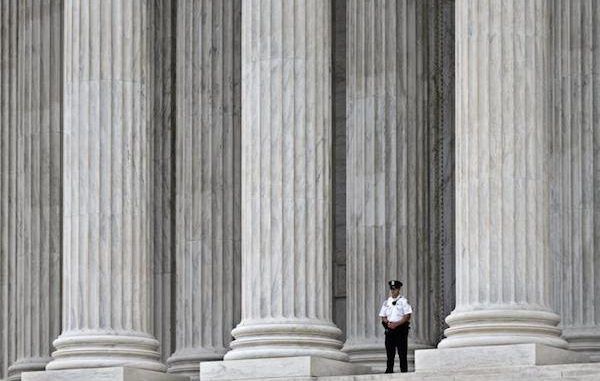
The U.S. Supreme Court is listening to arguments about whether violent statements posted on social media websites are proof of intent to harm.
In a case involving a man from Boston who posted violent lyrics on Facebook, the outcome of the case could affect how far free speech extends on the internet for everybody.
Boston.com reports:

BYPASS THE CENSORS
Sign up to get unfiltered news delivered straight to your inbox.
You can unsubscribe any time. By subscribing you agree to our Terms of Use
The case at hand involves an Allentown, Penn., man named Anthony Elonis, who posted violent rants and threats against his estranged wife, schoolchildren, and law enforcement on Facebook in 2010. He was found guilty of making threats and the court sentenced him to 44 months in prison. Elonis appealed to the Supreme Court, where he argued that he didn’t actually intend for his words to be threatening.
Words like this:
“If I only knew then what I know now/I would have smothered your ass with a pillow/Dumped your body in the back seat/Dropped you off in Toad Creek and made it look like a rape and murder”
Not pretty. But here’s the catch—Elonis claims these were rap lyrics. Rather than a threat, they’re just an expression of creativity and therefore protected by the First Amendment, just as they are for musicians and rappers who have garnered praise and awards for lyrics like these for years. Chief Justice John G. Roberts, Jr. even quoted Eminem’s “‘97 Bonnie and Clyde” during the debate.
The Supreme Court seems hung up on whether there’s a difference in the creative liberties allowed to artists and those allowed to independent individuals. The intent of a statement—whether or not it is meant to incite fear and/or violence—has been paramount in previous cases brought before the justices and the lower courts. Also, in some cases, it’s more about who the threats are directed at—the military, the President of the United States, your family and peers. Sometimes a test known as the “Dinwiddie factors,” which gauges the frequency, medium, and reaction to a said threat, is used to determine whether or not it’s valid.
If the court decides that Elonis’s intent was to show off his rap prowess and not to terrify two women and a bunch of children, it would set a problematic precedent, as Justice Samuel A. Alito Jr. notes:
This sounds like a road map for threatening a spouse and getting away with it. So you put it in rhyme and you put some stuff about the Internet on it and you say, ‘I’m an aspiring rap artist.’ And so then you are free from prosecution.
Tricky, right?
Let’s play a game where we decide which of the below rhymes are from Elonis’s case, which are from Enimem’s 1999 Grammy Award-winning album, The Slim Shady LP, and which are European murder ballads from the mid-17th century:
1.) You and your husband have a fight/One of you tries to grab a knife/And during the struggle he accidentally gets his Adams apple sliced/And while this is goin’ on/His son just woke up and he just walks in/She panics and he gets his throat cut/So now they both dead and you slash your own throat/So now it’s double homicide and suicide with no note
2.) There’s one way to love you/But a thousand ways to kill you/I’m not going to rest until your body is a mess/And dying from all the little cuts
3.) There’s a four-year-old boy lying dead with a slit throat/In your living room/What you think I’m kiddin’ you?/You loved him didn’t you?
4.) From his pocket a knife he drew/And pierced her tender body through/He ripped her up and there was by/A baby in her womb did cry/He then did hide among some thorns/The baby crawling in her arms
5.) Little agent lady stood so close/Took all the strength I had not to turn the bitch ghost/Pull my knife, flick my wrist, and slit her throat/Leave her bleedin’ from her jugular in the arms of her partner
6.) That’s it, I’ve had about enough/I’m checking out and making a name for myself/Enough elementary schools in a ten mile radius/to initiate the most heinous school shooting ever imagined/and hell hath no fury like a crazy man in a kindergarten class/the only question is, which one?
First off, let’s reflect: Graphic details of violence have been in music for centuries and that’s alarming. Secondly, Elonis only contributed to three of the above, but they all outline unspeakable horrors that any reasonable person may consider, well, a bit concerning if the words were directed at her.
While many First Amendment groups are concerned by the potential outcome of this trial, they may not need to worry. Should the Supreme Court grant Elonis a retrial, the jury would then have to find that he intended to create fear with his words, not merely that he happened to say them. The target of his words would be removed from the equation completely. So to speak, both nuances of rap artistry and web-speak are under a microscope.
As media attention increases on a growing number of Internet users (particularly women) who report being the targets of uncomfortable, unpleasant, and downright terrifying statements, Twitter and Facebook scramble to find a solution that doesn’t tred on their users’ First Amendment rights. The outcome of this case may make their obligation to users shift from protecting victims to protecting victimizers.
Answers: Elonis—2, 5, 6; Eminem—1, 3; “Savage Pastimes: A Cultural History of Violent Entertainment”—4

free speech has all the rights of free people. the govt has no right to limit it. but lately their refusal to limit nsa shows their corrupt agenda.
free speech has all the rights of free people. the govt has no right to limit it. but lately their refusal to limit nsa shows their corrupt agenda.
Righty backy too the gray out billy`SS^^^$$$